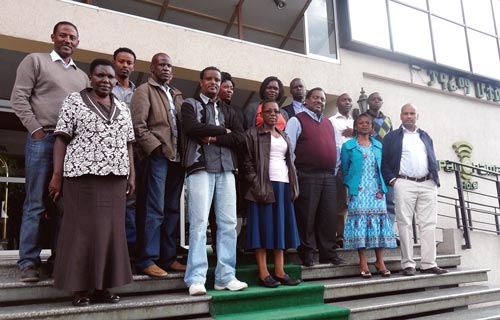 Understanding the value chain of maize and legume crops and the ability to define various actors as well as their contributions and constraints along the value chain is crucial in identifying feasible interventions. Since these activities fall within the scope of the SIMLESA (Sustainable Intensification of Maize and Legume Cropping Systems in Southern and Eastern Africa) initiative, national partners and CIMMYT staff took part in a training and writing workshop on value chain analysis held in Addis Ababa, Ethiopia, from 09 to 16 January 2013. The workshop was attended by 14 participants (8 national partners from Ethiopia, Kenya, Tanzania, and Mozambique, and 6 CIMMYT employees), and facilitated by Mot Jaleta (CIMMYT). Its objectives included capacity building and finalizing of pending reports related to Objective 1 of the program (to develop and target opportunities for impact through baseline studies and analysis of input and output value chains with particular reference to maize and legume seed systems and local markets), and among the topics covered were basic concepts of value chain analysis, quantitative methods in value chain analysis, and the identification of opportunities, constraints, and interventions at various stages along the value chain.
Understanding the value chain of maize and legume crops and the ability to define various actors as well as their contributions and constraints along the value chain is crucial in identifying feasible interventions. Since these activities fall within the scope of the SIMLESA (Sustainable Intensification of Maize and Legume Cropping Systems in Southern and Eastern Africa) initiative, national partners and CIMMYT staff took part in a training and writing workshop on value chain analysis held in Addis Ababa, Ethiopia, from 09 to 16 January 2013. The workshop was attended by 14 participants (8 national partners from Ethiopia, Kenya, Tanzania, and Mozambique, and 6 CIMMYT employees), and facilitated by Mot Jaleta (CIMMYT). Its objectives included capacity building and finalizing of pending reports related to Objective 1 of the program (to develop and target opportunities for impact through baseline studies and analysis of input and output value chains with particular reference to maize and legume seed systems and local markets), and among the topics covered were basic concepts of value chain analysis, quantitative methods in value chain analysis, and the identification of opportunities, constraints, and interventions at various stages along the value chain.
In his opening remarks, SIMLESA program leader Mulugetta Mekuria stressed the importance of the socioeconomic component of SIMLESA for technology development and dissemination through interaction with local communities and other stakeholders. “The Objective 1 team should be part and parcel of the technology development process, constantly monitoring and evaluating, and not only waiting till the project ends to do an ex-post study,” stated Mekuria. He also emphasized the importance of understanding the opportunities and constraints underlying the SIMLESA maize and legume input and output markets and highlighted the need for SIMLESA to continue placing the interests of smallholder farmers at the center of the program.
The workshop was concluded by presentations on the progress made on the value chain analysis reports by individual countries. Menale Kassie, SIMLESA socioeconomic component coordinator, then thanked all participants for their attendance and contributions. The participants considered the training a successful platform for learning and sharing experiences, and partners requested more similar technical trainings in the future.
 Capacity development
Capacity development